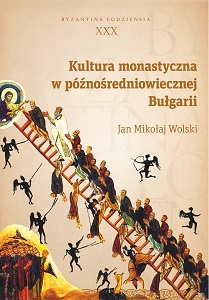Kultura monastyczna w późnośredniowiecznej Bułgarii (Byzantina Lodziensia XXX)
Monastic culture in the late mediaeval Bulgaria (Byzantina Lodziensia XXX)
Author(s): Jan Mikołaj Wolski
Subject(s): History, Cultural history, Middle Ages, Theology and Religion, 13th to 14th Centuries, 15th Century, History of Religion
Published by: Wydawnictwo Uniwersytetu Łódzkiego
Keywords: monasticism; late medieval Bulgaria; monastic culture; spirituality; biblioteki klasztorne; mnisi bułgarscy; klasztory; żywoty świętych; psalmodia; hymnografia; lektury biblijne
Summary/Abstract: The life of the monks was entirely attuned to one goal – the salvation of the soul. The desire to be saved and the idea of how it could be achieved shaped the foundations of monastic culture. Of all the Christians who declared the same overarching objective, the monks were distinguished by the fortitude of their resolve, which determined their characteristic radicalism. The greatest masters of Eastern Christian spirituality: Saint Basil the Great, Dorotheus of Gaza, Saint Isaac the Syrian and Saint John Climacus, would instruct those wanting eternal glory to never neglect the issue of their salvation. Ascetic life was thought to give a better chance of achieving salvation, as opposed to living “in the world”. In this work, monastic culture has been shown as a totality of symbolic means used by the monks to fulfil their life purpose. The dissertation is based on varied sources, primarily including what would be read by the monks in those days (selective choice), texts describing their lives (i.e., the lives of saints) and regulating them, and texts conveying the opinions of the monasteries and their inhabitants, written by the people living at the time (donation deeds of the then rulers, monks’ own writing).
- E-ISBN-13: 978-83-8142-095-2
- Print-ISBN-13: 978-83-8142-094-5
- Page Count: 230
- Publication Year: 2018
- Language: Polish
- eBook-PDF
- Table of Content
- Introduction
- Sample-PDF

